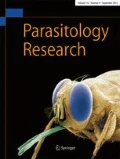
With the passing of Karl T. Friedhoff in September 2018, the international parasitological community has lost one of its prominent members and an esteemed colleague.
Karl Friedhoff was born in Beckum/Westphalia. His parents were farmers whose positive views and principles had a lasting impact on his own development. He often referred to these roots and kept a keen interest in agriculture for life. From 1952 to 1958, he studied veterinary medicine at the Schools of Veterinary MedicineFootnote 1 (SVM) in Hannover/Germany and in Vienna/Austria.Footnote 2 Due to his outstanding performance as a student, he received a scholarship of the prestigious German Academic Foundation in 1955. After a period in veterinary practice (1958–1959), he was awarded the Dr. med. vet. degree in Hannover 1959. Subsequently, he joined the Institute of Parasitology (IP) of the SVM as a research associate. At this time, he belonged to a small group of research associates who supported Prof. Dr. K. Enigk, director of the IP, in developing new concepts and facilities for experimental parasitology, which did not exist before. As a first step, Karl Friedhoff established a protozoological working group in the IP, and in 1963–1965, he expanded his research experiences and methodological knowledge through stays abroad—in the US NIH/PHS Rocky Mountain Laboratory, Hamilton, Montana, USA; the College of Veterinary Medicine, University of Illinois, Urbana, USA; and the CSRIO Laboratory Yeerongpilly, Brisbane, Australia. Furthermore, he acted as guest professor at the Faculty of Vet. Sciences, Chulalongkorn University, Bangkok, Thailand (April–October 1970) and the Faculty of Veterinary Medicine, Cairo University Gizeh, Egypt (February 1976). After his “Habilitation” in 1969, he was promoted to the Head of the Protozoology Unit at the IP (1970–1997) and became the Director of the IP (1986–1995). Two times, he accepted both the honor and the burden of serving as Rector of the SVM (1991–1993 and 1995–1997). In the latter function, he was engaged in establishing the international PhD program at the SVM and in extending international cooperation. From 1995 to 2005, he was the President of the Karl Enigk Foundation, which promotes young parasitologists in their research career.
Further information on his career and some remarks on his scientific achievements have been published at the occasion of K. Friedhoff’s retirement in 1998 in this journal (Eckert et al. 1998). Karl Friedhoff’s scientific interests were focused on the role of ixodid ticks in the transmission of protozoan parasites of the genera Babesia and Theileria, including parasite-vector interactions. For example, in cooperation with members of his team and other institutions, he published significant contributions on the development and ultrastructure of Babesia ovis in Rhipicephalus bursa, of Theileria annulata in Hyalomma anatolicum, and of Babesia equi in the salivary glands of vector ticks (Moltmann et al. 1983). The latter study revealed morphological characteristics similar to the genus Theileria. This observation—together with further findings—contributed to the redescription of Babesia equi as Theileria equi by Mehlhorn and Schein (1998). In 1962, Enigk and Friedhoff described Babesia capreoli as a new species from deer. Of his other research areas, only a few can be mentioned here: Epidemiology and serodiagnosis of infections with piroplasms in horses; tick-borne diseases of sheep and goats caused by Babesia, Theileria, or Anaplasma spp.; trypanosomes (Trypanosoma theileri) in European wild ruminants or cattle and their transmission by tabanids and studies on Giardia, Spironucleus, Histomonas, and Capillaria infections in chickens.
His encyclopedic knowledge of parasitology and other disciplines as well as his scientific-critical mind and his high motivation made K. Friedhoff a highly qualified university teacher and respected colleague. These qualifications played an important role in writing the German textbook “Lehrbuch der Parasitologie für die Tiermedizin” in which K. Friedhoff was co-founder and co-author of two editions (Eckert et al. 2005, 2008). Meanwhile, a 3rd edition (Deplazes et al. 2013) and an English version of this textbook have been published (Deplazes et al. 2016).
Karl Friedhoff was a dedicated scientist and an impressive, open-minded, personality with a high level of education; straightforward, reliable, enthusiastic in discussions; and often entertaining with his narratives concerning science, history, or aspects of current life. Our deepest sympathy goes to his wife Hildburg, his sons, and all members of his family. Together with them, colleagues and friends will keep Karl Friedhoff in thankful memory.
Notes
Now: University of Veterinary Medicine Hannover
Now: University of Veterinary Medicine Vienna
References
Deplazes P, Eckert J, von Samson-Himmelstjerna G, Zahner H (2013) Lehrbuch der Parasitologie für die Tiermedizin, 3rd edn. Enke Verlag, Stuttgart
Deplazes P, Eckert J, Mathis A, von Samson-Himmelstjerna G, Zahner H (2016) Parasitology in veterinary medicine. Wageningen Academic Publishers, Wageningen, The Netherlands
Eckert J, Hiepe T, Mehlhorn H (1998) On the retirement of Prof. Dr. K. T. Friedhoff, Hannover. Parasitol Res 84:255–256
Eckert J, Friedhoff KT, Zahner H, Deplazes P (2005, 2008) Lehrbuch der Parasitologie für die Tiermedizin. 1. und 2. Aufl. Enke Verlag Stuttgart
Mehlhorn H, Schein E (1998) Redescription of Babesia equi Laveran, 1901 as Theileria equi Mehlhorn, Schein 1998. Parasitol Res 84:467–475
Moltmann UG, Mehlhorn H, Schein E, Voigt WP, Friedhoff KT (1983) Ultrastructural study on the development of Basbesia equi (Coccidia: Piroplasmia) in the salivary glands of its vector ticks. J Protozool 30:218–225
Author information
Authors and Affiliations
Corresponding author
Additional information
Publisher’s Note
Springer Nature remains neutral with regard to jurisdictional claims in published maps and institutional affiliations.
Rights and permissions
About this article
Cite this article
Eckert, J., Deplazes, P. & Zahner, H. In memory of Prof. Dr. K. T. Friedhoff (* 05.06.1932 – † 02.09. 2018). Parasitol Res 118, 387–388 (2019). https://doi.org/10.1007/s00436-018-6184-0
Published:
Issue Date:
DOI: https://doi.org/10.1007/s00436-018-6184-0

